Scans
Click on images for full view.
Pablo Larraín was attending the 2019 Toronto Film when fate intervened. The Chilean director was there with a new film, Ema, but was already preoccupied with his next project, Spencer, a genre-bending impressionistic portrait of the late Princess Diana in which he wanted Kristen Stewart to star. He happened to be having a coffee meeting at the Hyatt Regency when he spotted the actress’ agent, WME’s Elyse Scherz. He quickly excused himself and chased her down, quite literally.
“I ran across the lobby and said, ‘I need to talk to you.’ We knew each other because she also represents Gael García Bernal, whom I have made many movies with,” Larraín recalls. Would Stewart be interested in playing one of the most famous women of the 20th century? Larraín kept pressing. Scherz thought it could be a great role for her client and that Larraín should ask Stewart right away. “She’s fearless, she’s brave,” he recalls Scherz saying.
Stewart herself was in Paris at the time promoting Seberg, the indie biopic about American actress Jean Seberg. She was in a car when she received Larraín’s call and immediately made her friends pull over so she could step outside and have some privacy. “I needed all my focus,” Stewart remembers.
Larraín explained his vision for the film. It would be a fable of sorts, an abstract fairy tale — anything, really, besides a traditional biographical drama like the many other Diana movies, docs and shows that had come before. “In reality, no one knows who Diana really is,” Larraín pitched. “She’s probably the most mysterious person of the 20th century and, at the same time, the most known person of the 20th century. That sort of enigma was fascinating for a movie, and I guess that’s how we started.”
Says Stewart, who has devoted her post-Twilight years to indie fare and working with auteur directors, “I couldn’t have imagined saying no.” But while she has been hailed abroad — her supporting role in Olivier Assayas’ Clouds of Sils Maria earned her a Cesar, France’s equivalent of an Academy Award, in 2015 — her turn in Spencer, which opened in select theaters Nov. 5, has made her part of the Oscar best actress conversation for the first time.
After Stewart said yes to the role, the rest of the elements fell into place just as quickly. Larraín had long conversations with British screenwriter Steven Knight (Dirty Pretty Things), elucidating his vision. While his 2016 film Jackie (in which Natalie Portman starred as Jackie Kennedy as she processed her husband’s assassination, earning an Oscar nom) was a more traditional biopic, with Spencer, Larraín wanted to push the envelope. He sought to move beyond the decorous historical re-creations of the hit Netflix series The Crown and the soapy melodrama of the critically panned 2013 movie Diana that starred Naomi Watts.
When Knight did sit down to write, he produced the screenplay in a mere four to five weeks. After speaking with several people who worked for Diana — he won’t say exactly who — Knight decided to use the queen’s annual holiday gathering at Sandringham Castle in 1991 as the film’s backdrop, since that’s when Diana and Charles’ doomed marriage hit a tipping point. “This was a particular Christmas when, by all accounts, she decided enough is enough. And so I thought if we could take that Christmas — Christmas gives you lots of visual and lots of emotional stuff — and give it a beginning, middle and end, or Christmas Eve, Christmas day and Boxing Day, that could be quite neat,” Knight says. “And then within that, we find out, who was she? What was in her head when all of this was going on?”
Knight also mixed in horror elements found in many fairy tales. “I wanted that feeling of the princess trapped in the enchanted castle and the attempt to escape the handsome prince,” the screenwriter says. His Diana draws from many tropes: Sleeping Beauty, Rapunzel, and even Jack and the Beanstalk. “A lot of fairy stories end with the escaping,” he explains.
Spencer‘s Diana is a solitary figure who, except for her two young sons, is far removed from the royal family. “Steve’s script lives in the gray area of Diana’s life,” Stewart testifies. “It lives in between the moments that you would think would be depicted in a movie. It’s never the meal, it’s the dirty dishes. It’s the wrapping paper between the presents being opened. It’s always her sort of getting dressed or undressing.”
While Larraín didn’t want a simple reenactment of Diana’s days and nights, Stewart still buried herself in research. The 31-year-old actress was 7 when Diana died and was never a royal junkie. (And, no, she hasn’t seen The Crown.) “I just kind of read everything. At some point, I kind of hit the end wall and had to stop,” she says. “I wasn’t fearful that any of it was going to distract or weigh me down in a way that inhibited me from really inhabiting her and that feeling of freedom. The research only mattered for me emotionally because I just sort of felt like I wanted to leave no stone unturned.”
Once Stewart was on board, Larraín, his brother and producing partner, Juan de Dios Larraín, and British producer Paul Webster lined up financing for the $18 million indie. Jack Farthing, a regular on the BBC series Poldark, was cast as Charles; Timothy Spall joined as an equerry and sort-of specter from the past, while Sally Hawkins took on the role of Diana’s royal dresser. The project was officially announced during the virtual Cannes film market in June 2020. Prominent indie distributor Neon — home of the Oscar-winning Parasite — paid about $4 million for U.S. rights, while leading sales outfit FilmNation sold off foreign rights. “Everyone took such an extraordinary swan dive off the cliff, and the movie has exceeded all expectations. To tell a story this human is a cinematic miracle,” says Neon chief Tom Quinn.
Fashion, inexorably a part of Diana’s image, became its own character in the film. Spencer costumer designer Jacqueline Durran cherry-picked a handful of Diana’s Chanel pieces that were now in the archives of the famed fashion house. “I looked at pictures of Diana from 1988 to ’92 and tried to figure out what her style was over that period,” she says. It helped that Durran — whose numerous credits include 1917, Little Women, Atonement and the upcoming The Batman — had dealt with Chanel numerous times and that Stewart is also a Chanel ambassador. The fashion house remade some of the pieces used in the film, including an evening gown by Karl Lagerfeld, since the originals were too fragile.
“In the movie, we kind of went in and out of accuracy. Some things are really accurate, and then we veer off and make something that’s much more impressionistic. And then we come back again to something that’s accurate so that the audience isn’t sure whether we’re doing something accurate or something inaccurate,” Durran explains. “I was trying to muddle things up.”
COVID-19 did pose some challenges, such as fabric shortages and a lack of tailors. Durran had to cram Stewart’s fittings into two marathon sessions in London in December 2020 and January 2021. “The first day was nine hours, which is just impossibly long, but Kristen is so fantastic, she just did it. We got to think about the whole costume arc from start to finish,” says Durran. Stewart admits, “It was exhausting and exhilarating and kind of awkward, to be honest, because details matter so much. But I will say that I was holding my breath and gritting my teeth.” Adds Larraín, “Jacqueline Durran said to me that it was the longest fitting of her career, which is a lot for Jacqueline. And I didn’t know if it was an achievement or a disaster.”
The wig created by Spencer makeup and hair designer Wakana Yoshihara — who also has Belfast and Death on the Nile coming up — was another key character.
For Yoshihara, the assignment was a blast from the past — much as the movie’s music pays tribute to Diana’s love of pop. In 1996, the year before the Princess of Wales died, Yoshihara had just started cutting hair in a London salon and had to test her skills on three different cuts in order to get a job. One was short layers. “I was thinking, ‘Nobody wants to have a haircut like this,’ ” she remembers. “But my senior stylist explained to me, ‘This is like Princess Diana’s hairstyle, this is very classic. If you can do this, you can do any hairstyle.’ So I practiced that hair cutting and then the blow-drying for maybe eight months, at least, until I passed the test,” Yoshihara says. For the film, she would set the wig every morning, and then brush, wet it and blow it dry every night, and sometimes style it between scenes.
Meanwhile, Stacey Panepinto, Stewart’s longtime makeup artist, perfected Diana’s look. “Stacey is really quick because she knows Kristen’s face. In the beginning, we left an hour and a half for hair and makeup and in the end we got it down to 32 minutes,” says Yoshihara, who is now working on the superhero pic The Marvels. One ongoing challenge for the two artists were Stewart’s eyebrows. Yoshihara was worried that repeatedly lightening her brows would make them fall out, though that disaster was avoided.
Any flaws would have been immediately detected, since during many moments in the film, the camera moves directly in on Stewart’s face. Cinematographer Claire Mathon (Portrait of a Lady on Fire) says she’s never positioned the lens so close, which was deemed necessary to create intimacy with the character.
The production itself shot for 37 days under COVID restrictions — everyone on set wore a mask save for Stewart so as not to disturb her makeup — during a period spanning from the end of January to the end of March. The vast majority of the shoot took place in Germany, where the producers took advantage of generous production incentives. Production designer Guy Hendrix Dyas and Larraín looked at more than 30 locations before finally deciding on two that would serve as substitutes for Sandringham House: Kornberg Castle, now an opulent five-star hotel in southern Germany, and Nordkirchen Palace, a working college in the western part of the country.
Under normal circumstances, access would have been almost impossible. But both locales were shut down because of the pandemic. Says Larraín, “We worked in a hotel that is a five-star, high-end hotel in the south of Germany and we shut it down for, I don’t know, a month. And we took most of the furniture out.”
For Dyas, there was one key advantage to these empty, sprawling spaces. “We didn’t want to walk into a space and just use it fully dressed, because again, we wanted to create these feelings of discomfort and a very loose fantasy based on an idea of Sandringham rather than a complete reproduction. It was really obvious to me that Pablo wanted to take us into the realms of a fairy tale almost rather than just a straight historically, visually accurate version of what Sandringham is.”
Unlike most of the Spencer team, Dyas is a regular Crown viewer, but he took a different tack in imagining Diana’s world, saying, “They obviously have a very talented team and have their own philosophy. They’re doing their best to create complete reproductions of everything to perfection.”
The Spencer production went on to film at soundstages in Berlin and at an outdoor park before cast and crew traveled back to London to shoot a final scene — no spoilers here — at an American fast-food restaurant. Ironically, it was perhaps the only time during the production that Stewart, who, like Diana, is no stranger to the paparazzi, wasn’t tracked down by a mob of photographers.
Larraín and his go-to editor, Sebastián Sepúlveda, finished cutting the movie in a short seven weeks. “It was so fast,” remarks Stewart, “it blew my mind.”
Now, as they go about promoting Spencer, which had its world premiere at the Venice Film Festival in September, Stewart is fond of finishing Larraín’s sentences. She still vividly remembers their first phone call as she stood on the side of that road in France. “I’ve been in a lot of movies and I’ve worked with renowned filmmakers,” she told Larraín recently as they sat together for an interview. “For a story like this, I would think that there would be a more extensive vetting process … not necessarily that I would come in and read scenes in a traditional audition … but I was definitely kind of surprised at your assurance. You were telling me you were so sure and to trust the process.”
Source Scans thanks to Gossipgyal

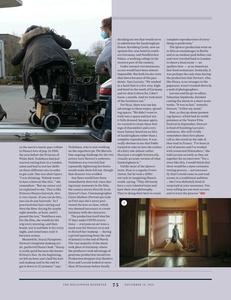
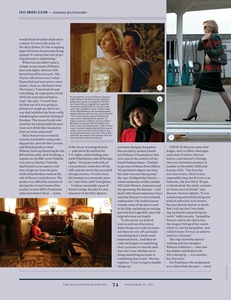
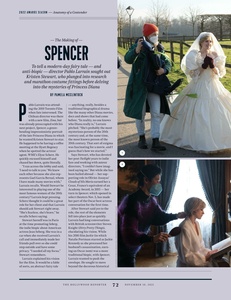
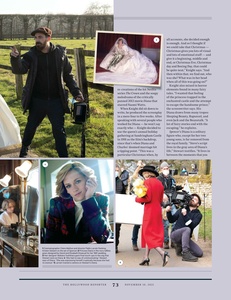
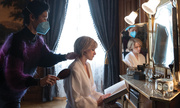

No comments:
Post a Comment
What do you think of this?